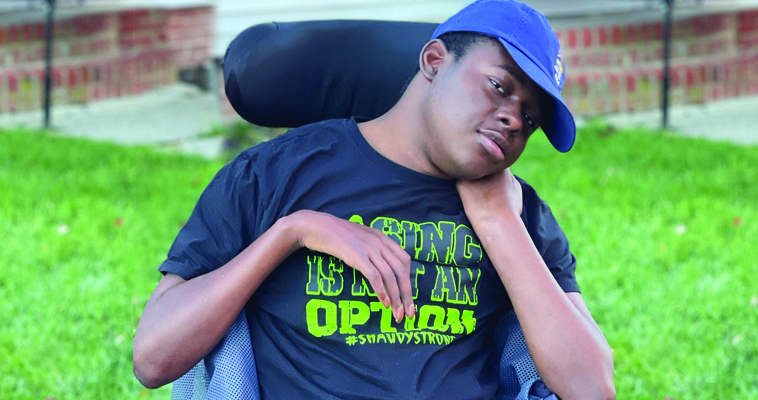
In 2020, you could find 20 year old Jashaud Jenkins at the basketball court, hanging out with friends, or practicing his skills behind the wheel with his newly acquired learner’s permit. You might find him spending time with family, teaching his little brother about sports or goofing off. No matter where he was, Jashaud was always the life of the party.
On March 28th, 2021, Jashaud was the backseat passenger in a car with three other friends. In an instant, a seemingly normal day transitioned to a nightmare when another vehicle ran a red light and struck their car. Once first responders had arrived, it took 25 minutes to get Jashaud out of the car. By this point, he had no pulse and EMTs were told that he was gone. Despite this, they decided to give him CPR for 33 minutes, which saved Jashaud’s life.
Jashaud was sent to Hartford Hospital where his long road to recovery began. His prognosis was grim, and the chance of permanent brain damage was extremely high. They found bleeding in his brain, two collapsed lungs, a fractured pelvis, and a complete spinal cord injury. He was consciously sedated for almost two weeks and on a ventilator, while doctors let his body recover and kept him stable. After 10 days, Jashaud woke up but unfortunately was unable to communicate. He stayed in the ICU for over a month.
On May 7th, Jashaud was transferred to a long-term acute care hospital at Hackensack University Medical Center in Westwood, NJ, a unit uniquely designed to serve patients who have complex medical needs and require a lengthy stay in an acute care setting. While recovering here, Jashaud was weaned off the ventilator with supplemental oxygen, something doctors originally said he would never be able to do. He was paralyzed but began working on speech therapy. After more than two months, doctors felt there was nothing more that could be done at that facility and Jashaud was transferred to the Hospital for Special Care in New Britain.
The Hospital for Special Care in New Britain is where Jashaud’s mother, Chloe, learned about the Money Follows the Person program (MFP). Although he has quadriplegia (paralysis of both arms and legs) and needed around the clock care, Chloe’s main goal was always to have her son back home. MFP was her first glimmer of hope, and she was ready to do whatever was necessary. She met with a care manager from the program and began working with a transition coordinator to outline their next steps.
Chloe described the MFP team as amazing and incredibly supportive. Seeing her son in the hospital every day was extremely overwhelming, as was dealing with his new condition. She felt as though doctors were too quick to give up on him or failed to see the progress Jashaud was making. MFP never made her feel that way, and instead always encouraged her confidence in Jashaud’s ability to successfully live in the community again.
The plan was underway as MFP helped get a ramp installed at Jashaud’s home and provided his family with medical supplies. MFP also acquired an iPad that Jashaud could use in various ways to help him communicate. Chloe hired a contractor to modify a bathroom that would meet Jashaud’s needs. Since he would also need around the clock care, Chloe and four other family members were trained to become paid PCAs.
Through MFP and the dedication of his family, Jashaud returned home on September 8th, 2022. He is so happy to be surrounded by family once again. Chloe mentioned, “We are a tight family unit; holidays and birthdays were not the same without Jashaud. We needed him home.”
Jashaud can now work on his independence in the setting that is best for him. He constantly has friends over and is getting good at using his cell phone again. He and his family are looking forward to seeing all the progress he will continue to make. Chloe finished our interview with mentioning the impact MFP has had. “We have had the opportunity to meet so many amazing people throughout this journey, and our hearts are forever grateful, thankful and blessed.”
Read the CT Money Follows the Person Quarterly Report
MFP Demonstration Background
The Money Follows the Person Rebalancing Demonstration, created by Section 6071 of the Deficit Reduction Act of 2005, supports States’ efforts to “rebalance” their long-term support systems, so that individuals can choose where to live and receive services. One of the major objectives of Money Follows the Person (MFP) is “to increase the use of home and community based, rather than institutional, long-term care services.” MFP supports this by offering grantee States an enhanced Federal Medical Assistance Percentage on qualified services. MFP also offers states the flexibility to provide supplemental services, such as assistive technology and enhanced transition services, to assist in successful transitions. States are then expected to reinvest the savings over the cost of institutional services to rebalance their long-term services and supports for older adults and people with disabilities to a community-based orientation.
